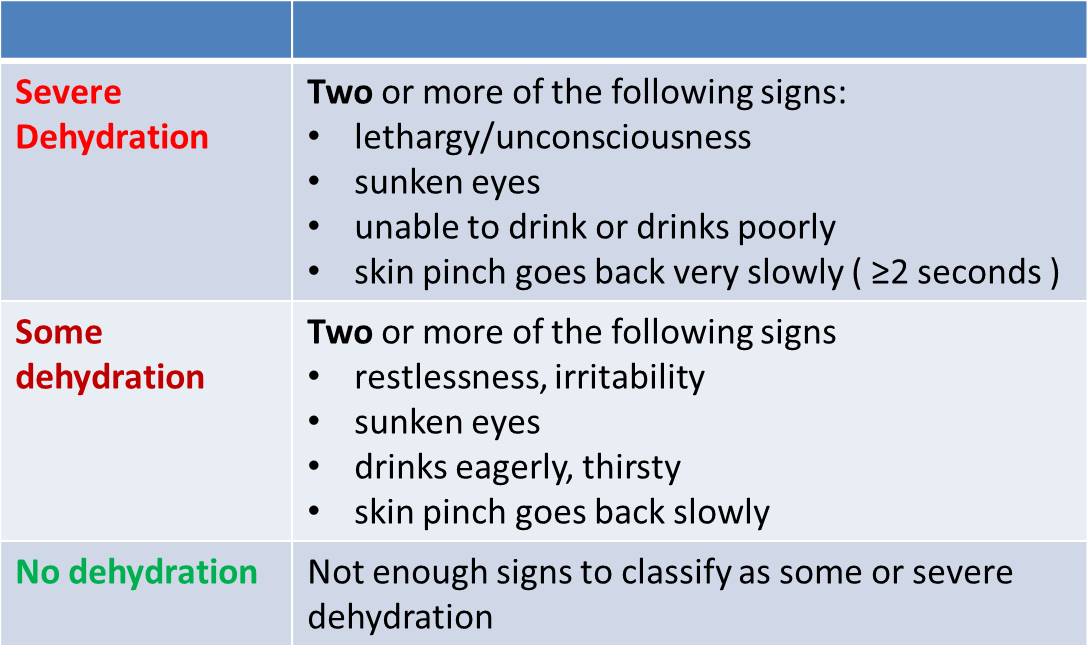A. Rehydration therapy,
B. Antibiotics ONLY IF indicated
C. Zinc supplementation and
D. Continued feeding
A. ASSESSMENT of DEHYDRATION followed by rehydration therapy
Hydration status should be classified as severe dehydration, some dehydration or no dehydration (as per the table below) and appropriate treatment given.
Severe Dehydration – Intravenous fluid
• Ringer lactate/ Diarrhea treatment solution (DTS)
• Normal saline only if the above two not available
• Dextrose solutions NOT RECOMMENDED
I/V therapy begins with ‘rehydration’ dose followed by ‘Maintenance therapy’- details in another blog
Some Dehydration – reduced osmolarity ORS - details in another blog
No Dehydration – ORT for prevention of dehydration
Give fluid and food and Advise mother
F U in 5 days if no improvement
If ORS packets are not available, can prepare sugar – salt solution at home VERY CAREFULLY- details here
B. CHEMOTHERAPY
Antibiotics NOT recommended as they may do more harm than good
Antibiotic to be considered only if the following causative agents are identified
Following medications SHOULD NOT be in treatment of diarrhea
1. Neomycin – can damage the intestinal mucosa
2. Purgatives – worsen diarrhea
3. Opium or Atropine – Dangerous for
-Children and
-Dysentery patients, as among these it can cause reduced motility of intestine leading to dangerous paralytic ileus
4. Loperamide – no benefit, can be dangerous
5. Cardiotonics for treating shock – hypovolemic shock in diarrhea must be corrected with I/V fluids and not by medicines
6. Steroids – no benefit, in fact can lead to adverse effects
Following drugs are of no value:
Charcoal, kaolin, pectin, bismuth and oxygen (unless otherwise required in the severely dehydrated in shock)
C. Zinc Supplementation
• Zn reduces the duration and severity of diarrhoea
• Dose: 10 mg for <6 months age and 20 mg for those above 6 months of age
• Duration: 10 – 14 days
D. Continued Feeding
References:
• K. Park, 2019. Epidemiology of Communicable Diseases, In: Park’s Textbook of Preventive and Social Medicine, 25th ed. Jabalpur, 2019
• Sirinavin S, Garner P. Antibiotics for treating salmonella gut infections. Cochrane Database Syst Rev. 2000;(2):CD001167
Clinical features suggestive of dehydration: http://www.ihatepsm.com/blog/clinical-features-suggestive-dehydration
ORAL REHYDRATION SALT (ORS): http://www.ihatepsm.com/blog/oral-rehydration-salt-ors
Management of Acute Diarrhoea in Children: http://www.ihatepsm.com/blog/management-acute-diarrhoea-children
4 Rules of Home Treatment for Diarrhea in Children: http://www.ihatepsm.com/blog/4-rules-home-treatment-diarrhea-children
Sugar Salt Solution for Rehydration: http://www.ihatepsm.com/blog/sugar-salt-solution-rehydration
6 Steps of ‘Skin Pinch’ Test for Assessing Dehydration: http://www.ihatepsm.com/blog/6-steps-%E2%80%98skin-pinch%E2%80%99-test-a...
Some Clinical features of diarrhea due to common causative organisms: http://www.ihatepsm.com/blog/some-clinical-features-diarrhea-due-common-...
Principles of management of diarrhea: http://www.ihatepsm.com/blog/principles-management-diarrhea
Control of diarrheal diseases: http://www.ihatepsm.com/blog/control-diarrheal-diseases
Indicators of Diarrhea Control: http://www.ihatepsm.com/blog/indicators-diarrhea-control
Vaccines for prevention of diarrhea: http://www.ihatepsm.com/blog/vaccines-prevention-diarrhea
Lecture on acute diarrheal disaeses-1 (epidemiology): https://www.youtube.com/watch?v=8VMSn7mJgm8&t=215s
Lecture on acute diarrheal disaeses-2 (control): https://www.youtube.com/watch?v=85iOg3GNevU&t=41s
Lecture (HINDI) on acute diarrheal disaeses-1 (epidemiology): https://www.youtube.com/watch?v=c-bOaC55u-g&t=5s
Lecture (HINDI) on acute diarrheal disaeses-2 (control): https://www.youtube.com/watch?v=acc-nqkjar4&t=1s
